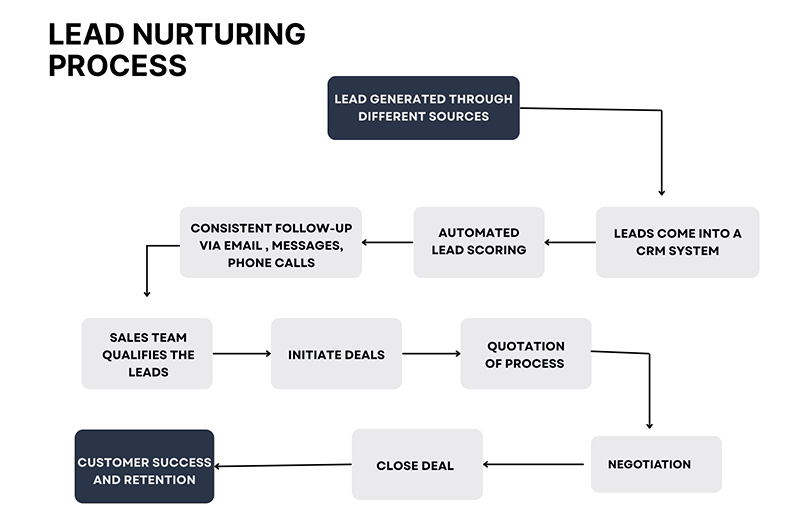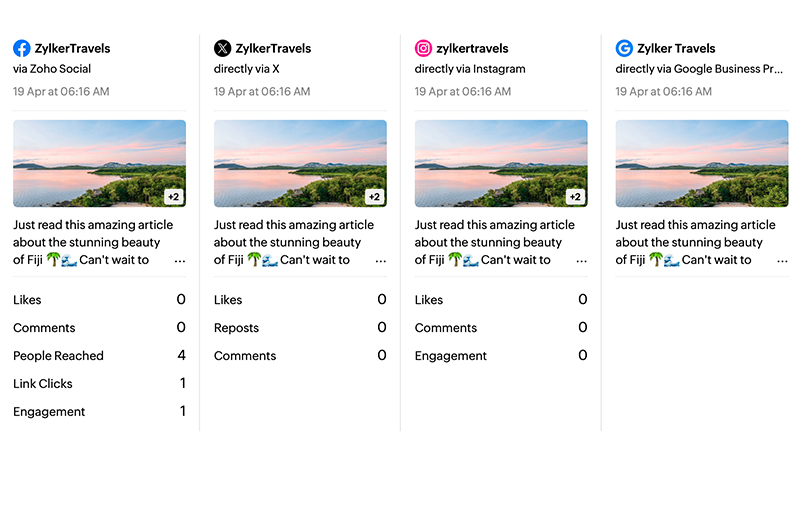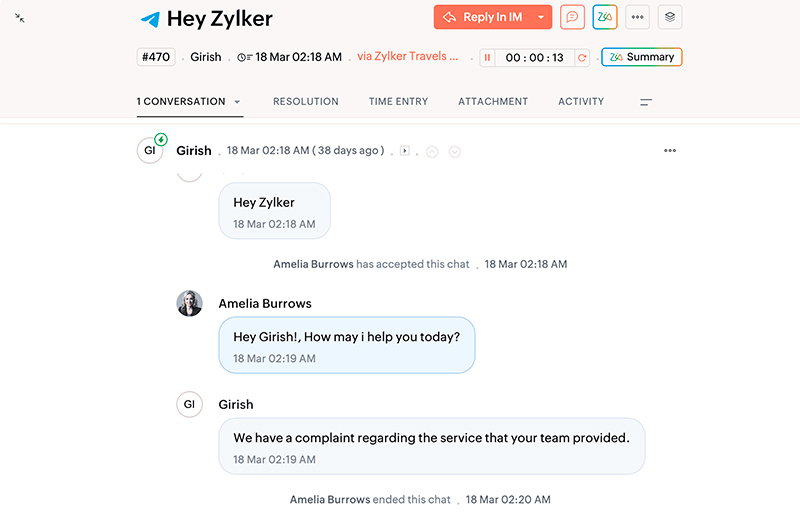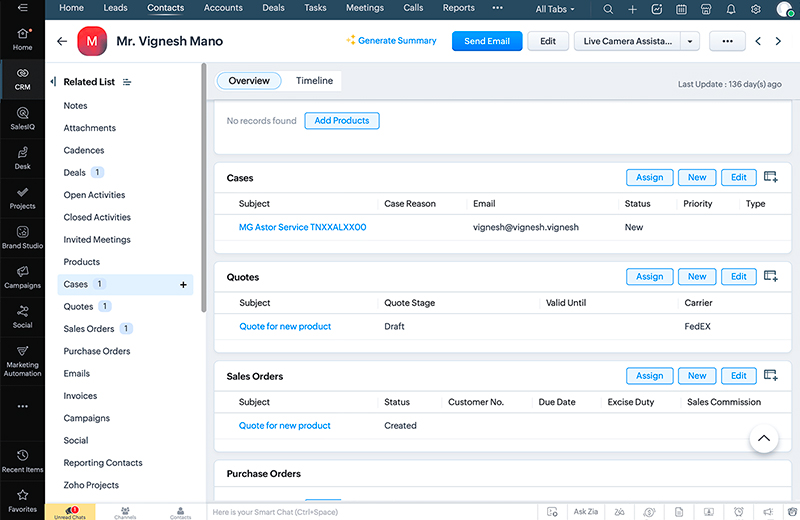What is lead nurturing?
Engage contextually with your prospects across all touchpoints throughout their buying journey, delight them with great experiences, and turn them into lifelong customers.
Get StartedWhat is lead nurturing?
Lead nurturing is a continuous process of building long-term relationships with your prospects through consistent communication and relevant content. It empowers your sales team to guide prospects through every stage of the customer journey easily.
The goal of lead nurturing is to move leads through each stage in the sales funnel by providing relevant and engaging content. When lead nurturing is done right, it combines essential components like identifying the right customers, consistent engagement, and segmentation, which ultimately results in boosting conversion rates and building long-term relationships.
What is a well-defined lead nurturing process or workflow?
A well-defined lead nurturing process begins right from the first point of contact—through marketing, initially, which involves marketing your product via multiple channels, including webinars, websites, social media, events, meetings, and more, with an aim to generate leads for your business.
Once you capture a lead, you add it to your CRM system so that your sales team can then take it forward. From there, the nurturing process begins. It involves consistent follow-ups through personalized emails, phone calls, and other communication channels. Many of these interactions can be automated—such as sending welcome emails when leads fill out webforms or visit your website. You can automate workflows and direct calls for a smooth engagement based on how your leads respond.
Leads are then segmented using a lead scoring system. Lead scoring is an essential part of the lead nurturing process that involves prioritizing and qualifying leads by assigning each one a numerical value based on specific criteria, like demographic information, lead source (e.g., trade show, website, webform), or level of engagement. Lead scoring helps prioritize prospects and ensure sales efforts are focused on the most qualified leads.
Once leads are segmented, consistent follow-ups occur through phone calls, emails, or messages. The system supports timely and relevant communication to help reduce the chance of missing out on potential leads
Once the sales team knows who's a potential customer, they initiate deals by quoting prices and negotiating to eventually close deals.
However, lead nurturing doesn't end at the sale, but continues post-purchase by focusing on building long-term relationships. This includes providing excellent support, responding promptly to questions, collecting feedback, and focusing on customer success and retention.
Let's look at a basic overview of the lead nurturing process:

Best practices for lead nurturing
Score and prioritize leads intelligently:
Not all leads are equally ready to convert. A smart CRM can use lead scoring based on behavior, engagement level, and demographic fit to help your team prioritize high-intent prospects. This ensures your sales reps focus their time and energy where it matters most, improving conversion efficiency.
Automate follow-ups and reminders:
Timely follow-ups are key to winning deals, but manual reminders can slip through the cracks. Automation ensures no lead is forgotten by scheduling reminders, follow-up emails, or even task assignments based on triggers or timelines. This keeps the pipeline moving smoothly and consistently.
Track and analyze performance in real time:
Your team’s success depends on visibility. Built-in analytics dashboards in your CRM can help you track campaign effectiveness, sales activities, lead sources, and engagement metrics. These insights allow for quick pivots, smarter strategies, and continuous improvement.
Collaborate seamlessly across teams:
Marketing, sales, and support teams all touch a lead at different stages. A unified CRM enables smooth handoffs, shared notes, and real-time updates, ensuring everyone is on the same page and delivering a consistent experience throughout the customer lifecycle.
Enrich lead profiles with contextual data:
Go beyond names and email IDs. Integrate your CRM with third-party tools to auto-enrich lead profiles with firmographics, social media activity, job titles, and more. This deeper context helps tailor messaging and identify upselling or cross-selling opportunities faster.
Choosing the right solution to nurture your leads
Choosing the best lead nurturing software is essential for success. Today, a good lead-nurturing CRM should empower your business to engage with leads consistently, communicate across channels, and track every interaction. It's no longer just about keeping contact information; a unified CRM platform simplifies your sales process and streamlines the entire nurturing journey. From automating follow-ups to ensuring data security, the right tool integrates marketing, sales, and service, making the entire nurturing process more impactful and efficient.
Here are some factors to consider while choosing your own CRM software:
Your CRM software should offer a complete, end-to-end view of the customer journey—from the moment they land on your website and reach out to the moment you close the deal and interact post-purchase. All your customer-facing teams, like sales, marketing, and customer service, should have access to customer information. Your CRM should be a single source of information to ensure customer data is easily accessible. Details like marketing sources, website activity, engagement history, email campaigns, notes, phone conversations, and survey answers should all be easily accessible.
For example, when you're handling a customer ticket, it's important to have instant access to the customer's sales history, past communications, and support interactions. A good CRM combines powerful components that cater to your customer-facing teams, enabling a seamless flow of customer information from marketing, sales, and support.

Your CRM software should be powered by AI to help your team work smarter and faster. A good AI assistant goes beyond just automating tasks; it can analyze data to provide smart recommendations on the best times to contact leads, prioritize hot prospects, and personalize outreach based on behavior. Furthermore, it should be able to monitor lead activity, help create visual dashboards, chat with your customers, identify customer sentiments in incoming tickets, recommend upsell or cross-sell opportunities based on customers' past sales histories, and reduce manual effort across your team.
Your CRM should grow with your business—without breaking the bank. Look for a solution that offers enterprise-level features at an affordable price that's suitable for startups and small firms. As your team and customer base expand, the software should remain flexible, cost-effective, and easy to adapt. It should maximize your return on investment by offering advanced features like automation, analytics, and omnichannel communication—all in a single package.
Your prospects engage across multiple platforms, including email, phone, social media, live chat, or surveys. A good CRM should unify all these platforms into one centralized system that enables your teams to view and respond to every interaction. This ensures no conversation is missed and context is preserved across channels.
For instance, let's say you run a travel company and a potential customer first sends you a message on Instagram requesting details about your recent ad campaign. A few days later, they call your support team with more questions.
With a good CRM, your team can see all these interactions in one place, so when your support agent picks up the call, they already know what the prospect asked on Instagram. The customer doesn't have to repeat themselves, and your team is already equipped with the full context of the prospect's relationship with your company, making the experience feel smooth and personalized.
This kind of communication ensures seamless omnichannel engagement by bringing all your customer communication touchpoints under one roof, which helps you maintain consistent and meaningful conversations.
You should also be able to manage all your social media pages—like Instagram, Facebook, LinkedIn, and Twitter—on a single platform. You can post, chat, and track responses from one dashboard to save time and make sure no customer message goes unanswered. This makes it easier to engage with your audience without jumping between multiple apps or tabs.
Your CRM software should enable seamless collaboration across teams by enabling the right people to step in at the right times. Lead nurturing often involves multiple touchpoints—and not every question can be handled by a single team. For example, suppose a prospect asks a question about a specific product feature that the sales team can’t answer in detail. In that case, they can easily route the question to the support team without delays or confusion. This guarantees timely and precise responses for the customer and results in a positive experience.

Companies often store sensitive customer information in their systems. Your CRM should prioritize data protection with security protocols to ensure customer information remains safe and compliant with regulations.
Lead nurturing requires consistency across customer engagements. Look for a CRM that automates repetitive tasks like email campaigns, follow-ups, and reminder messages so that your team never misses an opportunity to engage with a prospect. You should be able to improve response times and streamline your sales, marketing, and service operations with simple automation solutions. From capturing leads through webforms to nurturing them with timely email campaigns and efficiently managing tickets or tasks, automation makes your entire lead nurturing journey more efficient and impactful.

Zoho CRM Plus for lead nurturing
Zoho CRM Plus is a unified customer experience platform that brings together everything you need—from marketing and sales to customer service—into one powerful solution for lead nurturing. It simplifies the entire nurturing process by addressing common business challenges. Teams no longer have to manage multiple applications, as the unified platform combines analytics, support, marketing, and sales into a single, integrated solution.
Zoho CRM Plus ensures a consistent experience for each lead by facilitating smooth interactions across multiple touchpoints, including email, social media, live chat, and more. At the same time, smart lead segmentation and scoring technologies assist in customizing messages according to lead behavior and interests. Automated follow-ups and procedures eliminate the possibility of inconsistency and missing leads.
Zia, Zoho's AI assistant, ensures accurate and timely communication by offering insightful recommendations, such as the ideal times to contact leads. Zia can also search for information quickly from a large volume of data. Simply ask a quick question and get an immediate answer. For instance, if you're a sales manager and need to find out how many leads have been generated this month, you can simply ask your AI assistant and it will be able to fetch that data in seconds.
Zoho CRM Plus makes it simpler to monitor campaign performance and improve strategies by providing unified dashboards and real-time information. It empowers businesses to nurture leads effectively and move them through the sales funnel with confidence and clarity.